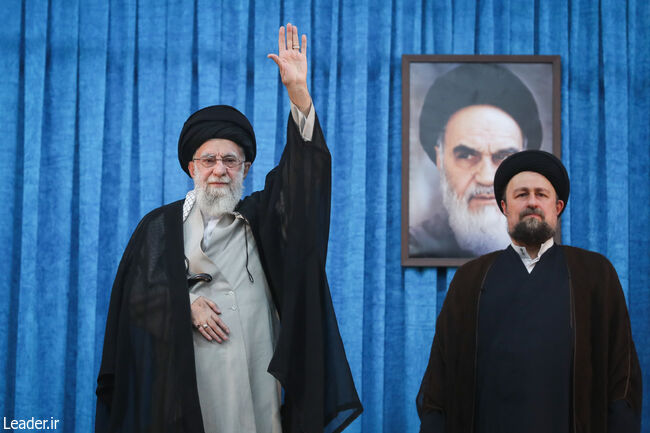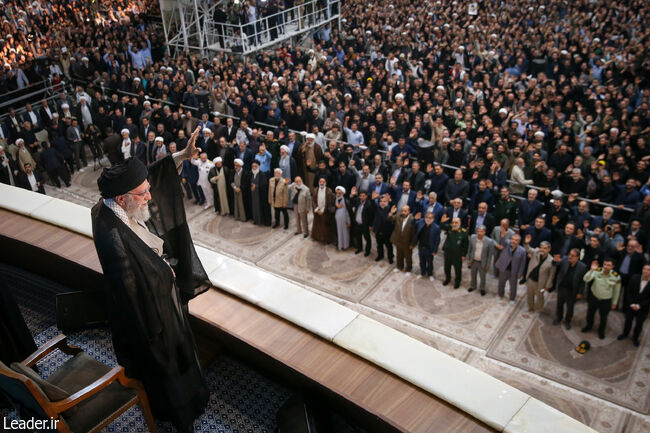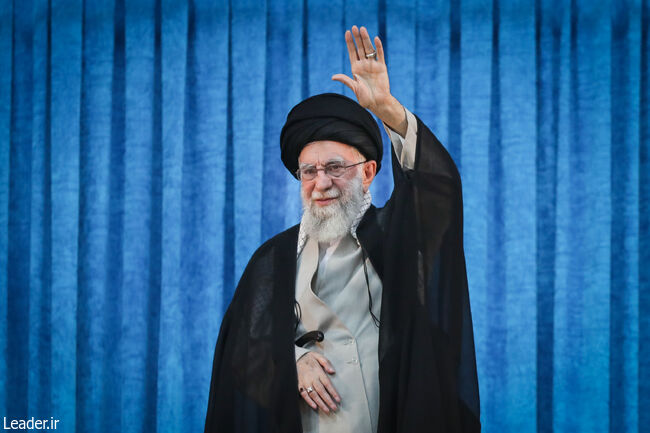In a massive and fervent gathering at the holy shrine of Imam Khomeini (ra) this morning, the Leader of the Islamic Revolution elaborated upon the tangible impacts of the Islamic Revolution on today's global developments. He said, "With wisdom and reason rooted in faith, the great Imam placed the principles for the continuing powerful and dignified progress of the Revolution and the country under the fundamental concept of national independence. And it is through these very principles that our beloved Iran will achieve further progress, public welfare, lasting security, an elevated international standing, and a bright future."
Elaborating on the national nuclear issue, Ayatollah Khamenei said that Iran's praiseworthy achievement of the complete nuclear fuel cycle resulted from the belief of the people and young scientists in the principle of 'We can.' He pointed out the significant impact of this industry on the advancement of other sciences and industries and regarded the nuclear plan proposed by the United States as being in complete opposition to the empowering 'We can' principle. He said, "Without enrichment, a powerful nuclear industry is practically useless. Let America and the Zionist regime know they can do nothing to achieve their main goal of dismantling Iran's nuclear industry."
He described Imam Khomeini as the great architect of the growing, stable, and powerful Islamic Republican system, saying, "Thirty-six years after the passing of this great man, his presence and the impact of his Revolution are clearly felt in such areas as the decline of the great powers, the emergence of a multipolar world order, the sharp fall in the status and influence of America, the rise of hatred toward Zionism even in Europe and America, and nations awakening to reject Western values."
The Leader of the Revolution pointed to the West's astonishment at the mobilisation of the Iranian people by a religious scholar, the victory of the Imam and the nation with their bare hands over the heavily armed and dependent Pahlavi regime, and the expulsion of the parasitic and plundering Americans and Zionists from Iran. He said, "The West's second shock was the establishment of the system of the Islamic Republic through the Imam's wisdom and his determined efforts."
Recalling America's hope for the rise of a subservient government in Iran to restore its illegitimate interests, Ayatollah Khamenei added, "By clearly expressing his position on establishing an Islamic and religious system in Iran, the Imam shattered that hope of the Americans and it was from this point that the enemies' destructive plotting began."
He described the scale, variety, and intensity of the West's, especially America's, destructive schemes against the Islamic Revolution as unprecedented in the history of modern revolutions. He stated, "Provoking ethnic strife, arming anti-revolutionary and leftist groups, inciting and supporting a bloodthirsty wolf named Saddam to attack Iran, and the assassination of the Imam's companions were some of the hostile acts of the enemy. These acts continued in later decades with the targeted killing of nuclear scientists."
The Leader of the Revolution cited the ongoing comprehensive sanctions, the U.S. military attack on Tabas, and the shooting down of an Iranian passenger plane over the Persian Gulf as further malicious acts by the enemies of the nation and the Revolution. He said, "Behind all these conspiracies stand arrogant governments, especially the U.S. and Zionist regime, and intelligence agencies like the CIA, British MI6, and the Mossad of the occupying regime." He stated that the goal of these depraved and destructive actions was to weaken the Islamic Republic, pointing out, "The nation and the system have withstood all these conspiracies and have neutralised more than a thousand plots. The Islamic Republic has not only remained unweakened but has continued its path with strength and will continue forward with even greater power in the future."
Ayatollah Khamenei considered the dominance of emotions over reason as a great affliction and a primary cause for the deviation of revolutions, citing the French Revolution as an example. He said, "The great Imam (may God have mercy on him), with divine wisdom and a reasoning rooted in faith in the unseen, protected the Islamic Revolution from this destructive affliction and shielded it. He did not allow emotional fervour to overpower reason, thus diverting the Revolution and the people's movement from its original path."
He described Wilāyat al-Faqīh and national independence as the two pillars of Imam Khomeini's reasoning. He said, "The pillar of Wilāyat al-Faqīh safeguards the religious aspect of the Revolution, preventing its deviation from the people's faith-driven motives and sacrifices. As for national independence, it encompasses many of the Imam's thoughts and objectives."
Ayatollah Khamenei rejected the false interpretation of national independence as national isolationism and the severance of relations with the world as incorrect and a kind of sophistry. He said, "National independence means that, by standing on their own feet and without reliance on others, Iran and its people should neither wait for a green light nor fear a red light from America or the like, but rather make decisions based on their own discernment and take necessary action regardless of the approval or disapproval of world powers."
In articulating the first principle derived from the great Imam's teachings on national independence, the Leader mentioned the principle of 'We Can'. He said, "Unlike the tyrannical Pahlavi regime, which had instilled a mentality of 'We can't' in the people, the Imam revived self-confidence and the spirit of 'We can' within Iran's national identity, especially among the youth and statesmen. This is the attitude and conviction that underlie the country's remarkable progress in scientific, technological, defence, development, and reconstruction sectors."
The Leader of the Revolution stated that malicious designs to eliminate the 'We Can' spirit among Iranians actually prove the unparalleled importance of this element of their identity. He noted, "Even now, in the nuclear issue and the talks currently underway through the Oman-mediated negotiations, the proposal presented by the Americans is entirely contrary to the principle of 'We Can.'
He identified the principle of 'Resistance', meaning action based on convictions and refusing to bow to the will, impositions, or bullying of global powers, as another pillar of national independence. Emphasising the enhancement of defensive power as another key principle, he stated, "At the dawn of the Revolution, our defence production capacity was negligible, nearly zero. However, with the encouragement and emphasis of the Imam, the work of building up defensive capabilities began. Today, even global defence analysts acknowledge Iran's regional leadership in key military domains, or express astonishment at the capabilities it has acquired despite sanctions."
The principle of 'clarification' (tabyeen) was another pillar of the great Imam's intellectual and practical framework for securing Iran's national independence. The Leader of the Revolution highlighted this. He said, "From the beginning of the movement in 1962 (1341 AH) until the final year of his life, the Imam would explain critical matters to the people. His writings in that final year, addressed to the public, the seminaries, and university students, rank among his finest works. Of course, the Imam's clarifications were not based merely on emotion; rather, they were founded on reasoning that persuaded the intellect, as he would speak to both hearts and minds simultaneously."
Ayatollah Khamenei identified the principle of "steadfastness (istiqāmah)", meaning not abandoning and continually unwavering adherence to the Straight Path, as another key element of the concept of national independence in the Imam's perspective. He said, "The great Imam aligned the hearts and minds of the people and youth with these principles, ensuring the Revolution's identity and its continued progress along the Straight Path through rationality rooted in these very tenets."
He stated that what some people mean by their call for "rationality" is, in fact, bowing down and submitting to America and the arrogant powers. He explained, "This is not rationality. True rationality is what the Imam demonstrated by empowering the people and the country with strength and dignity. He brought honour to Iran on the world stage and placed a bright future before the people. By continuing this nationally rooted path, founded on the Imam's wisdom, the people will attain lasting security, progress, public welfare, and an elevated international standing, God willing."
The Leader of the Revolution dedicated part of their speech to elaborating on the national nuclear issue and presenting key points for public awareness. He said, "Thanks to the intelligence of our youth and the efforts of our hardworking scientists, Iran has succeeded in attaining the complete nuclear fuel cycle, something that only a minimal number of countries in the world have achieved."
He did not consider the benefits of the nuclear industry to be limited to the production of clean and inexpensive electricity, he said, "The nuclear industry is a fundamental and pivotal one. According to reports from specialists and scientists, which should also be presented to the public, various fields of basic science and engineering, such as nuclear physics, energy engineering, materials science, as well as advanced and critical technologies in medical equipment, aerospace, and precision electronic sensors, are either dependent on or influenced by the nuclear industry."
Ayatollah Khamenei emphasised the critical applications of the nuclear industry in medicine, particularly in diagnosing and treating complex diseases, as well as its impact on industries related to agriculture and the environment. He said, "In nuclear technology, uranium enrichment is a fundamental and key point, one which our enemies have also focused upon."
Explaining why the vast nuclear industry would be futile without enrichment capability, he said, "Without enrichment, we would have to beg those who possess that capability to fuel our power plants just as if we were told that despite having oil, we had no right to build refineries or produce gasoline, and had to obey other nations' demands to purchase and supply us with fuel."
The Leader of the Islamic Revolution continued, "Without enrichment and the ability to produce fuel, even having a hundred nuclear power plants would be of no use; because to obtain fuel, we would have to beg the United States, who may impose dozens of conditions for fuel, and dozens of conditions, as we experienced in the 2000s with only 20% fuel supply."
He referred to the occasion when two friendly countries mediated, at the request of the then U.S. president, to transfer part of Iran's 3.5% enriched material in exchange for receiving 20% fuel to meet domestic needs. He said, "At the time, our officials agreed to the swap. I said that the other side must first deliver the 20% fuel to Bandar Abbas, and after we test it, we will proceed with the exchange. However, they broke their promise when they saw our precision and resolve and never delivered the 20% fuel."
Ayatollah Khamenei added, "Of course, during those political clashes, our scientists managed to produce 20% fuel domestically."
The Leader of the Revolution identified America's core nuclear demand as to completely strip Iran of this industry and its benefits for the nation, while rendering thousands of young nuclear researchers unemployed and demoralised. He said, "America's rude and insolent leaders continue to repeat this demand in various forms."
He characterised America's coercive demands as opposition to Iran's progress and self-sufficiency, adding, "We have stated these facts so that the Iranian people may have some information about it; the officials must elaborate further."
Recalling the admission of weakness by one of America's former presidents several years ago, who said, "If I could, I'd dismantle Iran's nuclear industry bolt by bolt," Ayatollah Khamenei said, "Our response to the bluster of America's reckless and incompetent government is clear." He continued, "Today, the nuts and bolts of our nuclear industry are far more firmly secured, and just as that President confessed that he failed to accomplish anything, the current Zionist and American rulers should know that they, too, will be utterly incapable of doing anything in this regard."
He said that the first response of the Islamic Republic to America and other opponents of Iran's nuclear program is to challenge the legal basis of their claims. He declared, "Our message to them is that the will of the Iranian nation is in its own hands. Who are you, and from what legal position do you give yourself the right to interfere in whether or not we carry out uranium enrichment?"
In the final part of his remarks, the Leader of the Revolution referred to the staggering and unimaginable atrocities of the Zionist regime in Gaza, noting that they had gunned down people gathering at a food distribution centre. He stated, "This depth of depravity, malice, brutality, and evil is truly shocking." He accused the United States of being a partner in the Zionist regime's crimes and declared, "This is precisely why we insist that America must leave this region."
Ayatollah Khamenei described the duty of Islamic governments as a grave one, and emphasised that, "Today is no time for caution, passivity, neutrality, or silence." He added, "If any Islamic government, in any form or under any pretext, whether through normalisation of relations, blocking aid to the Palestinian people, or justifying the Zionists' crimes, supports this regime, it will be certain that eternal disgrace will be stamped on its forehead."
The Leader of the Islamic Revolution said that the divine and eternal punishment for collaboration with the Zionists would be exceedingly severe, adding, "Even in this world, nations will not forget such betrayals. Moreover, relying on the Zionist regime brings no security to any government, for this regime, by God's decisive decree, is on the path to collapse, and God willing, its fall shall not be long in coming."
Ayatollah Khamenei also described the Day of ʿArafah as a springtime of supplication, humility, attentiveness, and reliance upon God. He advised the nation, especially the youth, to make the most of this opportunity by reciting the intimate supplication of Imam Ḥusayn (a.s.), and to also read, at least in part, Supplication 47 of Ṣaḥīfat al-Sajjādiyyah, and commune with God.
At the beginning of the ceremony, Ḥujjat al-Islām wal-Muslimīn Sayyid Ḥasan Khomeinī described the Islamic Revolution as the most popular, people-driven revolution in history. He said, "Dignity shapes the identity of a nation, and based on the repeated emphases of the late Imam and the Leader of the Revolution, we must always be vigilant to ensure that our Islamic and national dignity is never compromised under any circumstance."
The custodian of the sacred shrine of Imam Khomeini described the awakening and resistance sparked by the Islamic Revolution in Lebanon, Iraq, Yemen, and Palestine as significant, and, criticising the silence of some countries in the face of the Zionist regime's atrocities in Gaza, he said, "Today, the voice of the Imam still echoes in everyone's ears, that Israel must be obliterated and excised, for it is a cancerous tumour."



